Getting clear skin isn’t easy. But it’s not that hard either, if given some attention and care.
Everyone wants to have skin that is clear and radiant. Whether you have hormonal acne or are a teenager who struggles with puberty-related breakouts, all it takes to get clear skin is a proper diet, a good skincare routine, and a few lifestyle changes.
And if you keep these things right, trust me, you can truly get your dream skin.
This article literally has everything you’ll ever need to know about skin health and getting clear skin. So, get ready to learn some of the proven and well-researched tips and tricks to help you on your journey to clearer skin.
I have divided this entire article into 3 segments. Please read till the end if you want to have clear and healthy skin. Now, let’s start:
Segment 1: Lifestyle Changes
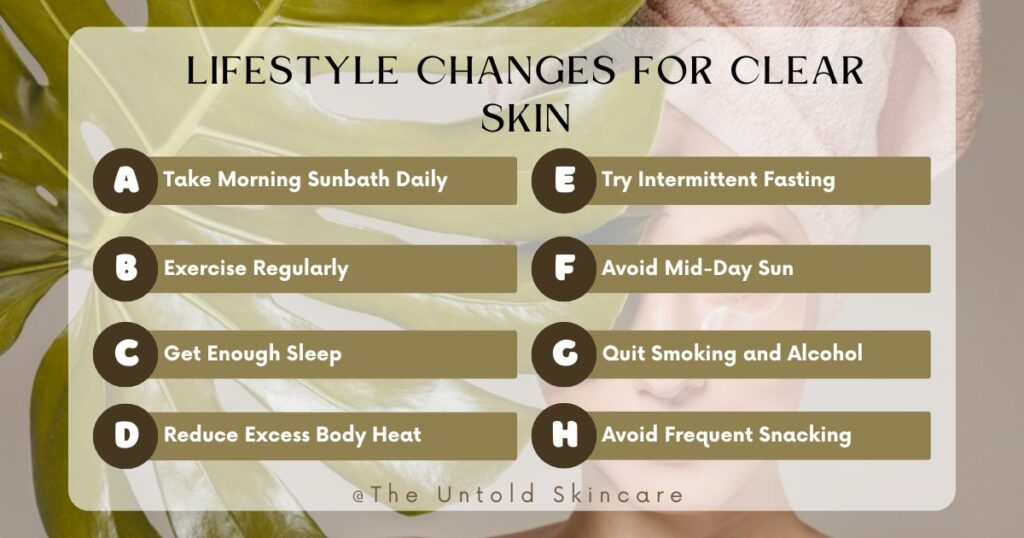
Take Morning Exposure/Sunbath Daily
Morning sunbathing is extremely beneficial for skin health in many ways.
The antibacterial properties of sunlight significantly aid in reducing the bacterial overgrowth in the skin. It can also kill some of the acne-causing bacteria, thus keeping the skin free of harmful bacteria and fungi.
Additionally, the vitamin D present in sunlight is crucial in promoting clear skin. Vitamin D plays an important role in skin cell growth, repair, and metabolism, helping to maintain clear and healthy skin.
So, start sitting in the morning sunlight regularly. Usually, 15-20 minutes of morning sun exposure is sufficient.
Exercise Regularly

Exercise increases the blood circulation and helps to remove toxins and impurities from the body which is crucial to get clear and healthy skin. Additionally, studies have found that regular exercise can also manage stress levels, which can further improve skin health.
Develop the habit of doing 15-20 minutes of light exercise regularly. You can also try different yoga postures like dhanurasana and halasana, which are backed by Ayurveda for their potential benefits in improving skin health.
An extremely important thing is that for some individuals, especially those with certain skin sensitivities or conditions, intense workouts can negatively impact the skin. This is something that I have personally experienced as well.
Although this happens only in rare cases, choosing low-endurance light exercise is still a safer option.
Related Post: Best Exercises For Glowing Skin
Get Enough Sleep

Enough sleep is vital to get clear skin for numerous reasons. Your body enters a state of repair when you are asleep. Repair and regeneration processes, in particular, occur in skin cells, which aid in the replacement of damaged cells with new ones.
Also, the majority of collagen, a protein that gives skin its structure, is generated while you sleep. Enough collagen keeps the skin supple and prevents wrinkles and fine lines from forming.
Additionally, lack of sleep is associated with increased stress hormones and can also increase inflammation in the body, which can degrade skin health.
Try to Reduce Excess Body Heat
The effect of excess body heat is one of the least talked-about aspects of skincare, but its impact can be extremely devastating for your skin.
Excess body heat can cause several skin issues like skin redness, inflammation, oily skin, enlarged pores, frequent breakouts, skin pigmentation, heat rashes, and many more. So, it is crucial to lower your body’s internal heat in order to obtain clear skin.
Drinking coconut water daily is one of the most effective ways of reducing body heat. A cold foot bath is another proven way to reduce body heat.
Read this article to learn some more tips for reducing body heat.
Try Intermittent Fasting

Intermittent fasting has gained significant attention in the realm of skincare in recent years. It is an eating pattern that involves switching between periods of eating and fasting.
Intermittent fasting helps to improve insulin sensitivity and regulate the blood sugar level. Your body improves its ability to manage glucose when you eat fewer calories in a constrained time period.
Another important benefit of intermittent fasting is its ability to significantly reduce inflammation. Most skin conditions, including acne, rosacea, psoriasis, and a host of others, are mostly triggered by this inflammation.
Additionally, intermittent fasting helps to trigger autophagy, a cellular process that involves the breakdown of damaged skin cells and replacing them with new, healthier ones. This can provide a more youthful and radiant skin complexion and help you to get clear skin.
Related Post: The Astonishing Benefits of Intermittent Fasting for Skin
Avoid Mid-Day Sun
The different UV rays emitted by the sun are extremely harmful to the skin. They are a proven cause of early skin aging and also dilate the small blood vessels present under the skin, making it more sensitive to environmental stressors.
Long-term sun exposure increases the risk of sunburn, which, over time, destroys the top layer of skin and raises the possibility of developing skin cancer.
UV rays can also break down collagen and elastin fibers in the skin, leading to skin sagging and loss of elasticity. These important skin structures are better protected by avoiding mid-day sun exposure.
So, avoid direct exposure to mid-day sun and always wear sunscreen while going out.
Quit Smoking and Alcohol Intake

Both alcohol and smoking have adverse effects on the skin. They are a proven cause of skin dehydration that causes fine lines and wrinkles and makes the skin dull.
They can trigger inflammation in the body, which may appear as redness, swelling, and skin problems like rosacea. They can also significantly reduce collagen production in the skin, which is vital for maintaining skin elasticity and firmness.
So, to get clear and healthy skin, it is highly advisable to quit smoking and alcohol intake entirely.
Avoid Habit of Frequent Snacking
Avoiding frequent snacking is extremely crucial in getting clear skin. Frequent eating is a proven cause of increased blood sugar whi,ch in turn increases the body’s insulin level.
This high insulin level results in excess production of sebum and can cause acne and breakouts.
So, avoid frequent snacking and try to reduce your eating frequency as much as you can.
Few More Lifestyle Tips
Don’t pick at pimples or blemishes, as it can worsen them and lead to scarring.
Change your pillowcases regularly to prevent the accumulation of oils and bacteria.
Clean your phone screen, as it can harbor germs that may come in contact with your face.
Avoid touching your face, as your hands can transfer dirt and bacteria.
Opt for lukewarm or cold water when showering or washing your face and avoid using hot water.
Segment 2: Dietary Changes
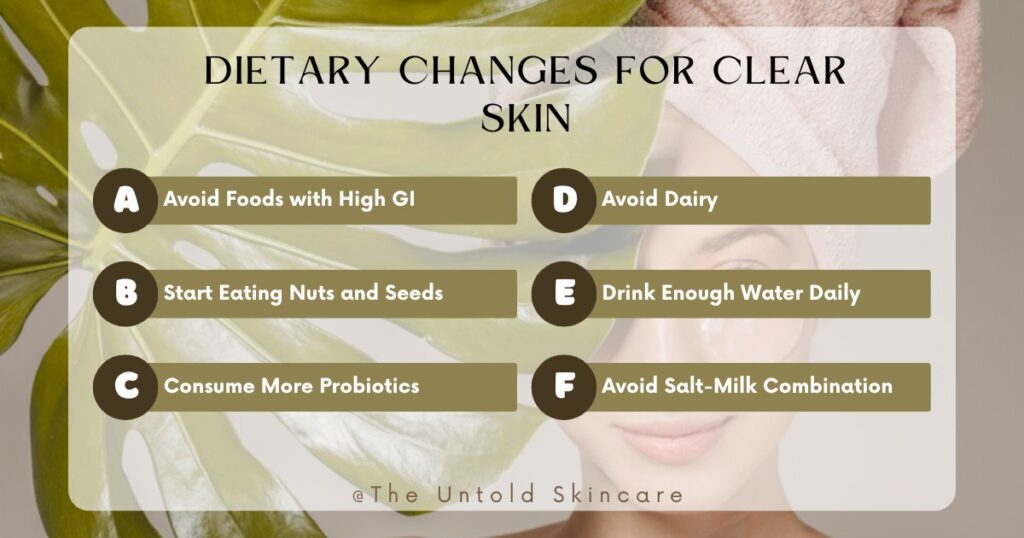
Avoid Foods With High Glycemic Index
Foods with a high glycemic index are one of the biggest culprits behind almost every skin issue. You need to avoid it to get clear and better skin.
Foods with a high glycemic index break down quickly into glucose and can cause a fast rise in blood sugar. This raises the body’s insulin level, which is a major cause of acne and skin inflammation.

Avoid processed sugar and carbohydrates at all costs. Avoid foods derived from white bread, white rice, refined sugar, and their combinations, such as doughnuts, cake, candy, etc. Increase your intake of fruits and vegetables as well, as they contain several beneficial nutrients for the skin and very little glucose too.
Start Eating Nuts and Seeds
Nuts and seeds are the superfoods for your skin. The extremely rich content of essential nutrients in nuts and seeds can significantly improve the appearance of skin.
Nuts and seeds are rich in healthy fats such as omega-3 fatty acids, which are one of the most crucial nutrients for healthy skin. Various minerals, such as zinc and selenium, present in nuts and seeds support skin cell renewal, boost collagen production, and promote wound healing.
Also, the rich content of fibers, antioxidants, and different vitamins in nuts and seeds adds more benefits to your skin health.
So, start eating nuts such as walnuts, almonds, brazil nuts, cashews, and seeds such as chia seeds, flax seeds, and watermelon seeds regularly to have clear skin.
Consume More Probiotics

Probiotics are directly linked to enhancing gut health by supporting healthy gut flora. Due to the fact that intestinal imbalances can cause systemic inflammation, decreased nutrient absorption, and a host of other problems, a healthy gut flora can have a direct impact on skin health.
Also, probiotics help to increase the number of good bacteria in the skin, thus maintaining a properly balanced skin microbiome. This helps in strengthening the natural skin barrier, prevents moisture loss, and protects the skin from environmental factors.
So, you should add more probiotics to your diet if you want to have clear skin. Sauerkraut, kimchi, kombucha, yogurt, kefir, etc., are some good sources of probiotics.
Avoid Dairy

A lot of research has been carried out regarding the effects of dairy on the skin, and it has been proven that dairy products can actually contribute to several skin problems.
Dairy products contain growth factors, such as insulin-like growth factor 1 (IGF-1). These growth hormones stimulate the production of skin oils (sebum) and contribute to acne development.
Lactose, the sugar found in milk, can also cause digestive issues in some people that can lead to gastrointestinal discomfort and inflammation, which may manifest as skin problems like acne.
Several studies have shown that the severity of acne is higher in people who consume dairy products daily.
Drink Enough Water Daily

Drinking enough water daily is vital to getting clear skin since water plays a vital role in various skin functions and can have a significant impact on its appearance and overall well-being.
It helps to keep the skin hydrated and maintain its elasticity, making it look radiant and youthful. It also supports the skin’s natural barrier function and promotes the body’s natural healing process.
So, consume up to 4 liters of water daily. It is strongly recommended to drink at least two glasses of water each day with lemon and ginger slices for additional skin advantages.
Avoid Salt-Milk Combination
A compatible food combination is necessary for better nutrient absorption, easy digestion, better gut health, and a stable blood sugar level. These are all related to skin health.
Salt and milk is probably the worst food combination for skin health. It can increase the body’s internal heat and can also cause harmful reactions since the composition of sodium in salt interferes with the cuddling effect that occurs when milk reacts with acid inside the stomach.
Avoid drinking tea or milk with salty foods, drinking milk right after eating, and using milk to prepare any kind of curry.
Related Topics: 6 Worst Food Combinations for Skin and Overall Health
Few More Dietary Tips
Fruits such as blueberries, avocado, and papaya are extremely beneficial for the skin. Consume them on a regular basis.
Also, add vegetables such as broccoli, bell peppers, carrots, spinach, and sweet potatoes to your diet.
Consume fish more frequently and add more antioxidant-rich foods. Start drinking green tea regularly.
Pay attention to any food sensitivities or allergies that may affect your skin. Common triggers include dairy, gluten, and certain food additives.
Segment 3: Skincare Routine And Products
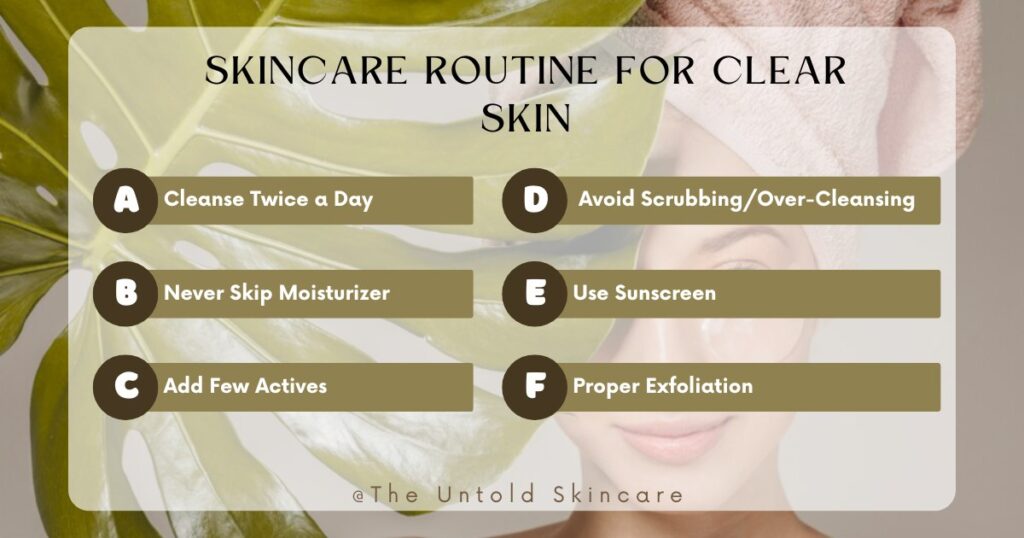
Cleanse Twice a Day

The first and most fundamental step in any skincare routine is cleansing.
You must wash your face in the morning to get rid of all the toxins that get built up during skin detoxification while you sleep at night. Similar to this, cleaning your face at night is crucial to get rid of all the dirt and oil that accumulates during the day.
Always use a cleanser that is mild and won’t damage your skin. It is advised to select a cleanser with salicylic acid if you have oily skin.
A cleanser with benzoyl peroxide as an active component is the ideal choice for skin that is prone to acne. Similarly, a non-foaming gel-based cleanser may be a preferable option for those with dry skin.
Never Skip Moisturizer
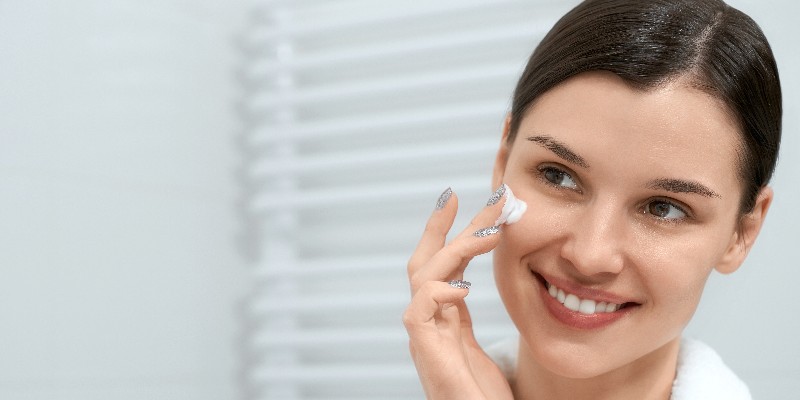
Moisturizing is another important part of a skincare routine.
Moisturizers help to lock in and replenish the skin’s moisture, preventing it from becoming dry and dehydrated. It helps to regulate oil production by sending signals to the sebaceous glands that there’s no need to produce excessive oil.
Skin that is properly moisturized is less likely to develop wrinkles and fine lines, making the skin look young and radiant.
Additionally, moisturizers can aid in enhancing the skin’s texture by making it softer and smoother. This may improve the skin’s overall appearance.
Regular moisturizing also assists in lessening skin inflammation as well as dryness, flakiness, and itching.
Always look for moisturizers that have ingredients like ceramides, hyaluronic acid, or glycerin as a key ingredient.
Add a few actives depending on Your Skin Concern
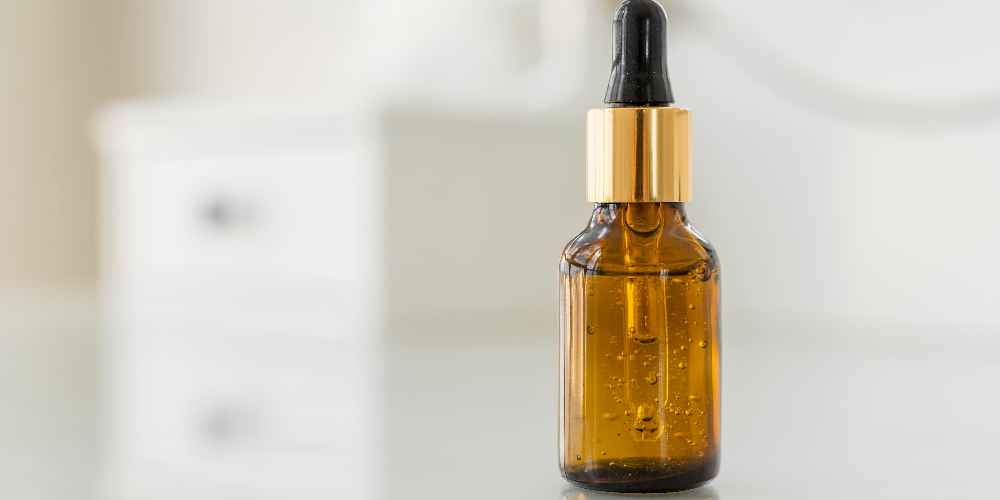
This step is optional, but addinga few other actives to your skincare routine can help you tackle the specific skin concern that you may have.
It’s critical to choose the best active ingredients for your skin, and you should always consider your skin type and any particular skin problems you may be experiencing when choosing the right actives.
You can add Hyaluronic acid to your routine if you have dry or dehydrated skin.
Retinol is another ingredient that is well-known for providing all-around benefits to the skin. It works for almost every skin type.
You should not miss adding Benzoyl Peroxide if you have acne-prone skin. For people with oily skin, salicylic acid is a great option.
Related Post: 5 Best Skincare Ingredients of All Time
Avoid Scrubbing/ Over-Cleansing
Over-cleansing or scrubbing the face is one of the worst skincare practices.
You may destroy the protective skin barrier, making it more vulnerable to environmental stressors and infections by over-cleansing or scrubbing the skin.
It can also remove all the friendly bacteria and necessary oils from the skin, adding even more problems.
Additionally, it can also cause skin irritation, exacerbate breakouts, and increase skin sensitivity.
Use a Good Sunscreen

We have already discussed what mid-day sun can do to your skin and why you need to avoid it.
So, never miss applying sunscreen while going out. Select a broad-spectrum sunscreen with an SPF 30 or above.
Use enough to cover all exposed skin, especially on your face, neck, and any other sun-sensitive areas.
Always look for ingredients such as zinc oxide or titanium oxide in your sunscreen as they are considered among the best in sun protection.
Proper Exfoliation

Exfoliation is actually quite an important step in skincare, and I highly recommend including it in your routine. It can significantly improve the appearance of your skin and can also help to reduce acne and breakouts.
Exfoliation involves removing dead skin cells from the skin, revealing new, healthier skin underneath. It makes the skin feel smoother and softer and can also help to prevent and treat clogged pores.
Additionally, it also encourages the skin to renew itself more rapidly by promoting cell turnover. This can help fade the appearance of dark spots, sun damage, and fine lines, giving the skin a fresher look.
Never use physical exfoliators for exfoliation. Use chemical exfoliators such as AHAs and BHAs.
It is generally recommended to exfoliate 1-2 times a week but do not over-exfoliate your skin as it can irritate the skin and disrupt the natural protective barrier.
Also Read: The Simplest and the Only Topical Skincare Routine You’ll Ever Need
Few More Tips on Skincare Routine
One crucial thing to keep in mind is to use skincare products exclusively during the specific time of day when they are most effective. A night skincare product should always be used at night time and so on.
It’s crucial to keep in mind that some people may experience skin redness, skin burning, or skin irritation after using any type of treatment agent. If so, you should immediately stop using them.
When introducing completely new products into your routine, perform patch tests if you think they can cause irritation or allergic reactions.
Always follow the manufacturer’s instructions for each product, including recommended usage frequency and application techniques.
If using multiple products, apply them in the correct order. A general guideline is to start with lighter, water-based products and finish with thicker, oil-based ones. This helps products penetrate effectively.

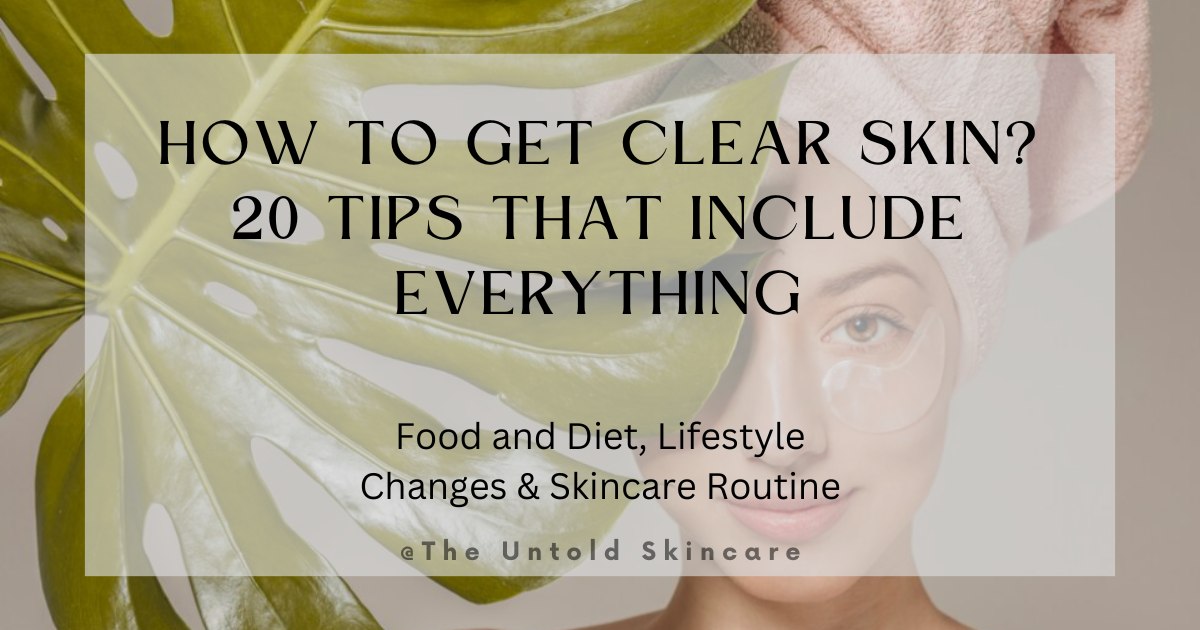
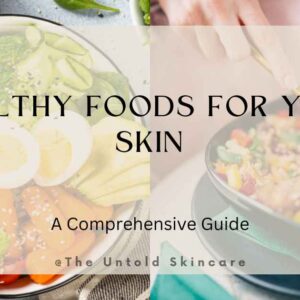

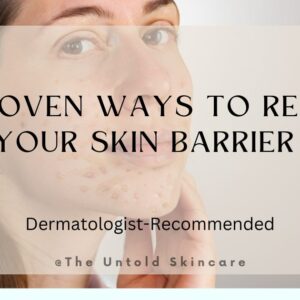
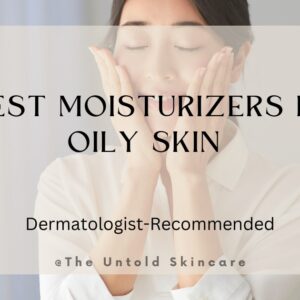
Getting clear skin is indeed a journey that requires dedication and consistency. The tips provided, like morning sun exposure and regular exercise, seem practical and beneficial. It’s interesting how sunlight and vitamin D play such a crucial role in skin health. However, I wonder if there are specific skincare products that complement these natural methods effectively? German news in Russian (новости Германии)— quirky, bold, and hypnotically captivating. Like a telegram from a parallel Europe. Care to take a peek?